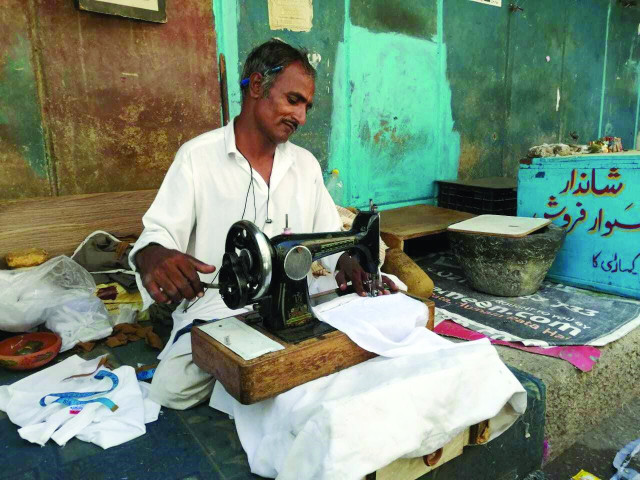The tailor by the roadside
Haq, who hails from Rahim Yar Khan, has been stitching clothes on a footpath in Karachi for the past 30 years

In Karachi, no one is an outsider. The sprawling city, dotted with high-rise buildings and slums, concrete landscapes interposed with green spaces and colonial-era architecture juxtaposed against more edgy structures, is quick to take into its fold even first-time visitors. No matter how shabby or inapt, one is sure to find a home in this city by the sea.
Ziaul Haq, who came to the metropolis in 1990, has found himself living on a pavement right across the Cantonment Railway Station. He is one among the city’s numerous street dwellers who flock to the metropolis in search of livelihoods and hopes of realising their dreams. Once they are here, they realise that the struggle to survive in the city is hard and only the most resilient are able to bear the hardships it offers along with the fruit for their labour. However, Haq’s struggle has been much harder.
Polio affected both his legs at a very young age. Mobility has been a challenge since then, but against all odds, he has been successful in finding a livelihood in the big city.
Haq tackled the difficulties of building a new life in Karachi from scratch head on, and today, on the very street that is his home, he runs a tailoring venture.
“I never wanted to be a burden on society and have been working hard to earn a living,” he told The Express Tribune.
Passing by the Cantonment Railway Station, one is likely to spot Haq sitting on the footpath opposite it, using a hand-operated sewing machine, oblivious to the hustle and bustle around him. Unlike the city’s other tailors, he charges his customers a meagre amount - a mere Rs250 for a pair of shalwar kameez. Elsewhere in the metropolis, tailors frequently customers up to Rs1,000 to stitch a pair of shalwar kameez.
Hence, it doesn’t come as a surprise that most of his customers, including porters, waiters, rickshaw and taxi drivers, are daily-wage workers. Also struggling to make ends meet, like Haq, getting their clothes stitched by this roadside tailor is affordable for them. In this way, Haq has been making their survival in the city easier amid persistently rising inflation.
“Most of them bring hand-me-downs which I alter to fit their size,” said Haq, adding that he also repairs clothes when needed. The tailor added, “Most times I don’t haggle with my customers over the charges and sometimes I don’t take any payment from them at all.”
Haq says he can stitch outfits from scratch but physical limitations make it difficult for him to produce a finished product as he is unable to move to get the clothes pressed and overlocked, purchase buttons or get buttonholes prepared.
He rarely gets any clothes to stitch from scratch, but when he does, he makes sure that he doesn’t charge his customers much higher, accommodating the residents of his home away from home the best he can.
With this spirit of working to facilitate others in every way possible, Haq is able to earn Rs500 to Rs600 daily. And a significant share of his meagre earnings is spent on supporting his siblings in Rahim Yar Khan.
“It is due to a lack of resources that I am unable to set up a proper shop,” he explained. “This continues to be my shop and my home, where I sleep soundly at night,” he added pointing to the footpath.
And whenever he needs to leave his residence by the roadside, he uses a tricycle with a hand paddle to commute.
It has been over 30 years since Haq has been living in Karachi. But, as living in the city can be a bane and boon at the same time, Haq continues to face challenges other than limited mobility.
“Others have established business on this footpath as well and now they are threatening me to leave this spot,” he said. “I appeal to the relevant authorities and officials of the Pakistan Railways to take strict action against them.”
Haq doesn’t want to leave his home of over 30 years. Expulsion will mean leaving behind his customers as well. His sleep at night on the rock-hard footpath is not as sound these days. But then there is the relentless belief that Karachi does not abandon anyone. It may beat one down, but it doesn’t desert one. So in the worst case scenario, Haq will find himself another footpath to live on, among new neighbours, who too are here in the big city to stitch together a living.
This story is part of a weekly series that seeks to bring to light the unsung heroes of Karachi - the hawkers, traders, doctors, teachers, engineers, lawyers and daily-wage labourers. It is they who make Karachi the city of lights.
Published in The Express Tribune, April 19th, 2021.



















COMMENTS
Comments are moderated and generally will be posted if they are on-topic and not abusive.
For more information, please see our Comments FAQ